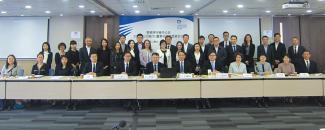The Hong Kong Institute of Chartered Secretaries Regional Board Secretary Panel (RBSP) Roundtable Meeting (RBSP Meeting), held on 16 January 2020 in Hong Kong, focused on new deregulatory changes relating to the notice period for convening general meetings of Mainland companies.
The Hong Kong Institute of Chartered Secretaries (the Institute) holds five RBSP Meetings every year in Hong Kong and cities on the Mainland. These forums are designed to assist Institute members and Affiliated Persons from both the Mainland and Hong Kong to keep up to date with the fast-changing regulatory environment in which they work.
At the latest RBSP Meeting, held on 16 January 2020 in Hong Kong, over 40 company/board secretaries representing Hong Kong and dual-listed Mainland companies gathered to learn about the latest deregulatory changes to the notice period of convening general meetings of shareholders from Rex Man, Vice-President, Listing Department of Hong Kong Exchanges and Clearing Ltd (HKEX); Tom Chau, Partner and Head of the Beijing Office of Herbert Smith Freehills; and Lawrence Wang, Partner, Beijing Office of Fangda Partners.
After thanking the audience for participating in the RBSP Meeting, Dr Gao Wei FCIS FCS(PE), Institute Vice-President, Vice-Chairman of Mainland China Focus Group and Board Secretary and Finance Chief of Zhongguancun Science-Tech Leasing Co Ltd, reiterated that the Institute as a professional body is committed to training governance professionals and helping them navigate legal and corporate governance complexity across borders. The purpose of this RBSP Meeting was to assist board secretaries of Mainland companies listed in Hong Kong, that is H share companies, to update their articles of associations and procedure rules for shareholders’ meetings to accommodate new regulatory requirements, he said.
To meet increasing shareholder and stakeholder expectations, Dr Gao added that company/board secretaries are expected to play an even more significant role as governance professionals. To equip company secretaries with the right mix of legal knowledge and practical skills, the Institute introduced a new qualifying programme, known as the Chartered Governance Qualifying Programme (CGQP), in January this year. Examinations will be held simultaneously in Hong Kong and the Mainland in June and November every year.
The internationally recognised CGQP is now open to degree holders in Hong Kong and the Mainland who are eager to upgrade their qualifications. The new curriculum in the CGQP gives interested candidates the professional knowledge they need for their governance roles. Successful candidates will be awarded the dual designation of Chartered Secretary (CS) and Chartered Governance Professional (CGP) of the Institute and The Chartered Governance Institute (formerly The Institute of Chartered Secretaries and Administrators).
The notice period for convening general meetings
In its reply to the China Securities Regulatory Commission (CSRC) last October, the State Council of the People’s Republic of China (PRC) announced deregulatory changes concerning companies registered in the Mainland and listed abroad. Accordingly, the notice period for convening general meetings of shareholders, shareholders’ proposal rights and requirements for convening procedures will have to comply with the PRC Company Law, rather than Articles 20-22 in the Special Provisions of the State Council Concerning the Floatation and Listing Abroad of Stocks by Limited Stock Companies (Special Provisions).
Mr Man of HKEX explained that H share companies, after making necessary amendments to their articles of association, will no longer have to comply with the 45-day pre-meeting written notice rule as stipulated in Article 20 of the Special Provisions. Instead, the notice period required will be subject to the PRC Company Law and the Hong Kong listing rules. This means that the notice period will be cut to 20 days for annual general meetings (AGMs) and 15 days for extraordinary general meetings (EGMs) after the relevant provisions in the articles of association have been revised.
According to Article 41 of the PRC Company Law, shareholders must be notified 20 days before the AGM and at least 15 days before the convention of an EGM. Similarly, E1.3 of Appendix 14 of the Hong Kong listing rules stipulates that an AGM shall be announced 20 working days in advance and shareholders must be notified of an upcoming EGM 10 working days or 15 calendar days in advance – whichever notice period is longer.
Moreover, shareholders who wish to attend a scheduled meeting do not need to reply in writing, and the company does not have to calculate the number of voting shares represented by the shareholders intending to attend the meeting based on the written replies received 20 days before the scheduled general meeting in order to determine if the meeting is to proceed or not. In addition, shareholders who individually or collectively hold more than 3% of the company’s shares may submit an interim proposal 10 working days before the general meeting of shareholders. Their shareholding does not have to reach 5% as previously.
Under the Hong Kong listing rules (Appendix 13D to the Main Board Rules and Appendix 11C to the GEM Rules), a Mainland-based issuer’s articles of association must include the Mandatory Provisions for Companies Listing Overseas (Mandatory Provisions) issued by the Mainland regulatory authorities. According to Mr Man, one of the questions frequently asked by Mainland issuers is whether the articles of association, as amended, would continue to comply with the requirement of Appendix 13D/Appendix 11C.
The short answer is yes. According to the Main Board Rule 19A.53/GEM Rule 25.40, a Mainland issuer shall observe and comply with the PRC Company Law, regulations and its articles of association. Given this, the Mainland issuer would still be in compliance with the rules. The issuer is also reminded that under Hong Kong’s Main Board Rule 13.51(1)/GEM Rule 17.50(1) it must, at the same time as it dispatches a circular to shareholders on the proposed amendments, submit to The Stock Exchange of Hong Kong Ltd (the Exchange) a confirmation from its legal adviser that the amendments to the articles of association conform to Hong Kong’s listing rules requirements and the Mainland laws and regulations.
Practical solutions
Following Mr Man’s briefing, Mr Chau of Herbert Smith Freehills and Mr Wang of Fangda Partners further explained the rationale behind the rule changes and gave practical advice on how to amend issuers’ articles of association.
While the 45-day notice period was considered to be appropriate in the 1990s when the Mainland was opening up its economy, the internet has made it much faster for listed issuers to reach out to shareholders anywhere, anytime. At the same time, as the Mainland’s regulatory environment has become more stringent, it makes more sense to make the preparation for shareholders’ meetings more efficient.
When amending the articles of association, Mr Chau and Mr Wang recommended that Mainland issuers consider the latest rule changes, in particular the reduced notice period for convening general meetings described above. Other aspects issuers should consider include the fact that there is no longer a need for shareholders intending to attend a scheduled meeting to respond with a written reply.
Moreover, the registration of transfers of shares or of transfers of any class of shares may be suspended during notice periods. Previously, the Mainland (via the Mandatory Provisions, PRC Company Law, Rules for the General Assemblies of Shareholders of Listed Companies) and Hong Kong (via the listing rules requirements on the suspension of transfers of shares during notice periods) included the requirements listed below.
- Mandatory Provisions (the Mainland) – Article 38: within 30 days to the general meeting of shareholders no change in the register of shareholders due to share transfers may be registered.
- PRC Company Law (the Mainland) – Article 139: within 20 days to the shareholders’ meeting, or within five days before the company’s decision to distribute dividends, no change in the register of shareholders shall be registered. However, if there are other provisions in the law regarding changes in the register of shareholders, those provisions shall prevail.
- Rules for the General Assemblies of Shareholders of Listed Companies (the Mainland) – Article 18: the interval between the dates of shareholders’ registration and meeting shall be no more than seven working days.
- Listing Rules (Hong Kong) – Article 13.66: an issuer must announce any closure of its transfer books or register of members in respect of securities listed in Hong Kong at least six business days before the closure for a rights issue, or 10 business days before the closure in other cases.
The contradiction between the above provisions of the Rules for the General Assemblies of Shareholders of Listed Companies and the Mandatory Provisions can cause confusion when it comes to actual company practices, which vary from one company to another. For example, some dual-listed companies serve A share and H share holders the same 30-day pre-meeting notice, while some companies give only a seven-day pre-meeting notice to A share holders and a 30-day pre-meeting notice to H share holders.
Since Article 38 of the Mandatory Provisions remains applicable, H share companies will still need to issue an announcement to suspend the registration of the register of shareholders approximately 45 days beforehand. This renders the company unable to act on an approved decision in a timely manner and shorten the pre-meeting notice period meaningfully.
Also, the suspension of the register of shareholders 30 days in advance may encourage speculation (after the shareholders have sold their shares, they are still on the register of shareholders and can participate in voting at the upcoming shareholders’ meeting), which not only affects the interests of the company, but also the interests of small shareholders.
To resolve these contradictions, H share companies listed in Hong Kong are recommended to delete the provisions on the period of suspension of changes in the register of shareholders required by the Mandatory Provisions; otherwise, the relevant provisions on suspension of changes in the register of shareholders should be made in compliance with the applicable laws and regulations of the company and the laws and regulations of the company’s place of listing.
According to Article 57 of the Mandatory Provisions, notices convening general meetings shall be delivered to shareholders (with or without voting rights at the general meeting) by hand or by prepaid mails to the address as recorded in the register of shareholders. The announcement for A share holders, as mentioned, shall be published in one or more newspapers as designated by the securities supervisory authority of the State Council 45–50 days prior to the date of meeting. Mr Chau and Mr Wang suggested that issuers should remove the clause ‘45–50 days prior to the date of meeting’. Furthermore, they suggested that Article 55 of the Mandatory Provisions be removed from issuers’ articles of association, since the same requirements made in the Special Provisions has already been identified as not applicable.
With regard to the necessary revision to be made to the Special Voting Procedures for Class Shareholders (Article 83 of the Mandatory Provisions), they suggested that the provision be revised along the lines of: ‘Where the Company convenes a class meeting, a written notice shall be given pursuant to the requirements of the notice period for convening a general meeting (as specified in the Company Law) to notify all the shareholders of the said class in the shareholders’ register of the issues to be considered at the meeting, as well as the date, time and venue of the meeting’.
In theory, pre-vetting of announcements has been one of the means through which the Listing Department of the Exchange in Hong Kong gives guidance to listed issuers on rule compliance issues, including publishing an announcement under the listing rules. But, in practice, though the required notice period of shareholders’ meetings has been shortened to 15 days, the actual notice period for H share companies is only seven to eight days shorter than for Hong Kong listed non-Mainland companies.
That is because the time the Exchange needs to pre-vet shareholder circulars is about 15 trading days. Together with the 15-day notice period, the actual notice period can be as long as 37 or 38 days. Besides, both lawyers believe that there is a tendency for speculative submission of circulars for pre-vetting.
They suggested that the Exchange should explore possible solutions to resolve these issues, such as improving pre-vetting efficiency and minimising circular approval time; developing a pre-vetting system or measures to standardise the filing of circulars for shareholders’ meetings against speculative circular filing for pre-vetting; issuing official guidelines on approved practices for shareholder circulars; or even abolishing the pre-meeting circular review and approval requirement.
The Exchange’s intention is to completely cease pre-vetting of all announcements of listed issuers but to maintain the pre-vetting of material shareholder circulars of listed issuers, according to Mr Man. Having said that, the Exchange welcomes enquiries from listed issuers and encourages them to consult the Listing Department on rule compliance issues to at least the same extent as guidance provided under the pre-vetting regime.
Both the Mainland and Hong Kong regulators will continue to work closely together towards a more transparent market and the more efficient, effective corporate governance framework envisioned by the State Council. H share companies should follow the relevant regulations and complete the revision of their articles of associations in a timely manner, the speakers concluded.
Jimmy Chow
Journalist
放寬股東大會通知期限制
本年度的香港特許秘書公會地區董事會秘書小組會議,已於1月16日於香港順利舉行,會議重點討論召開股東大會通知期相關條例的變化。
香港特許秘書公會(公會)每年都會於香港和內地城市,舉辦五次地區董事會秘書小組會議。一如既往,今年會議旨在幫助公會內地和香港會員和聯席成員,及時了解其公司上市所在地的監管要求變化。 於2020年1月16日在香港召開的地區董事會秘書小組會議上,來自香港和內地上市公司的40多家公司/董事會秘書聚首一起,聽取由香港交易及結算所有限公司(香港交易所) 上市部副總裁文伯溢、史密夫斐爾律師事務所合夥人兼北京辦事處負責人鄒兆麟律師、以及方達律師事務所北京分所合夥人王蓓良律師,就內地和香港股東大會通知期限適用法規變更的講解。 公會副會長,公會中國內地關注小組副主席,中關村科技租賃股份有限公司董事會秘書兼財務負責人高偉博士FCIS FCS(PE)對會員出席年度地區董事會秘書小組會議表示感謝,並重申,公會作為一家公司治理專業機構,致力於培訓公司治理專業人員,幫助他們應對法律和治理的複雜環境。他指出,2020年地區董事會秘書小組會議的目的,旨在協助香港上市的內地公司(即H股公司)的董事會秘書根據新的監管政策更新其公司章程細則和股東會議的程序規則。 高博士補充說,為滿足股東和持份者日益增長的期望,公司秘書/董事會秘書作為治理專業人員,應發揮更大作用。為協助公司秘書/董事會秘書獲取充分的法律知識和實務技能,公會於今年1月推出了新的專業資格認證課程,稱為“特許公司治理專業資格課程”(CGQP), CGQP考試將於每年的六月和十一月在香港和內地同時舉行。 CGQP考試獲國際認可,香港及內地有志於提升自身專業資質的學位持有者均可參加此考試。 CGQP的課程體係將為考生提供從事治理相關工作所需要的專業培訓。考試合格後,學員將獲頒由香港特許秘書公會及特許公司治理公會 (The Chartered Governance Institute) 認證的“特許秘書”(CS) 及“Chartered Governance Professional”(CGP) 雙重專業資格。召開股東大會通知期限
根據去年10月國務院致中國證券監督管理委員會(中國證監會)的批复,國務院宣布了對在內地註冊並在海外上市的公司召開股東大會通知期限等事項的適用法規。按其規定,召開股東大會前的通知期限、股東的建議權和召開程序的要求,必須符合《中華人民共和國公司法》(《中國公司法》)的規定,毋須再遵守《國務院關於股份有限公司境外募集股份及上市的特別規定》(《特別規定》)第20-22條中就涉及在國外發行和上市股票的有限責任公司的規定。 香港交易所的文先生解釋說,H股公司在對其公司章程細則作出必要的修改後,將不必遵守《特別規定》第20條所規定的在會議前45天發出書面通知。取而代之的是,股東大會的通知期限制將受《中國公司法》和香港《上市規則》的約束。這意味著,在修改公司章程的有關規定後,股東周年大會的預先通知期限將縮短至20天,臨時股東大會的通知期限將縮短至15天。 根據《中國公司法》第41條規定,上市公司必須在股東大會召開前20天及股東特別大會召開至少15天前通知股東。同樣,香港《上市規則》附錄14的E1.3條規定,股東周年大會應提前至少足20個營業日,其他股東大會應提前至少足10個營業日或15個日曆日向股東發送通知(孰早长為準)。 此外,欲參加股東大會的股東將毋須以書面回复,而公司也不用在會議宣布前20日,根據收到的股東書面回复,計算擬出席會議的股東所代表的有投票權的股份數量,以決定是否如期舉行。此外,單獨或者合計持有公司3%以上股份的股東,可以在股東大會召開十個營業日前提出臨時提案,不必達到5%。 根據香港上市規則(《主板規則》附錄13D和《創業板規則》附錄11C),內地發行人的公司章程必須包括內地監管機構發布的《到境外上市公司章程必備條款》(《必備條款》)之規定內容。文先生指出,內地發行人經常提出的問題之一是,修訂後的公司章程細則是否會須繼續遵守上述附錄13D /附錄11C的規定。 對此,文先生回應到,根據《主板規則》第19A.53條/《GEM規則》第25.40條,內地發行人須遵守及符合《中國公司法》、《特別規定》以及內地發行人的公司章程規定。內地發行人遵守了上述規定,便算是遵守了《上市規則》的規定。但發行人同時須留意,根據《主板規則》第13.51(1) 條/《GEM規則》17.50(1)條,其就建議公司章程細則修訂向股東發送通函時,須同時向香港聯合交易所有限公司(香港聯交所) 呈交由其法律顧問出具的確認函,當中確定公司章程細則的修訂符合《上市規則》規定以及內地法律及法規的要求。解決方案
在文先生作完簡要介紹後,鄒律師和王律師進一步解釋了規例變更的原因,並就如何修改發行人的公司章程提供了實用建議。 雖然在1990年代初內地經濟改革開放之時,45天的股東會議通知期是合適的。但時移勢易,互聯網普及,上市發行人現已能迅速、隨時隨地與股東聯繫。同時,隨著內地的監管環境變得更加嚴謹,股東會議的準備工作也必須更高效、更有意義地進行。 他們建議,內地發行人在修訂公司章程細則時,要考慮最新法規,特別就縮短上述召開股東大會的通知期限的新規定要作出相應修訂。發行人也毋須繼續要求有意參加預定會議的股東以書面形式答復作實。 此外,股份轉讓或任何類別的股份轉讓的登記,應在股東會議通知期內暫停。在修例前,要注意內地(《必備條款》、《中國公司法》,《上市公司股東大會規則》)和香港(關於在通知期內中止股份轉讓的《上市規則》)有關法規的以下要求:- 《必備條款》(內地)– 第38條:股東大會召開前30日內,不得進行因股份轉讓而發生的股東名冊的變更登記。
- 《中國公司法》(內地)– 第139條:股東大會召開前20日內或者公司決定分配股利的基準日前五日內,不得進行錢款規定的股東名冊的變更登記。但是,法律對上市公司股東名冊變更登記另有規定的,從其規定。
- 《上市公司股東大會規則》(內地)– 第18條:股東登記日與會議日期之間的間隔應當不多於七個工作日。
- 《上市規則》(香港)–第13.66條:上市公司必須在暫停股份登記前10個營業日進行公告。



